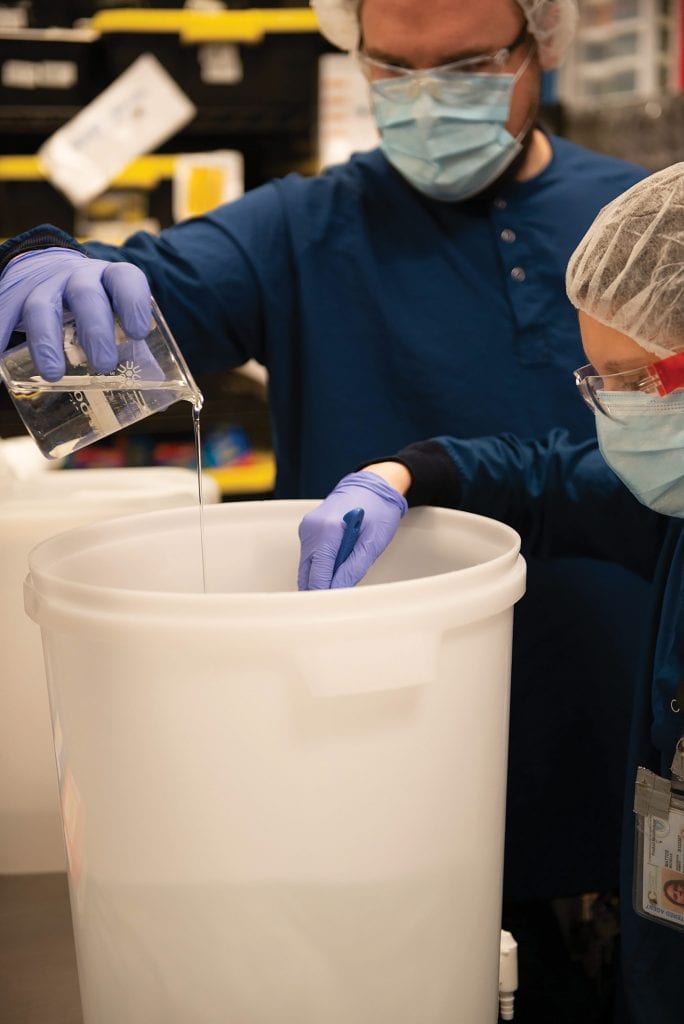Loss of Recreational Sales Hits Cannabis Dispensaries Hard
Essential Concerns
By Mark Morris
When COVID-19 arrived and the list of non-essential businesses was determined in Massachusetts, dispensaries that sell recreational cannabis were among those hit hard by the shutdown.

With two locations in Western Mass., Theory Wellness sells medical and recreational cannabis in its Great Barrington dispensary and only recreational products in Chicopee. Thomas Winstanley, director of marketing for Theory, said the sudden halt in recreational sales had a huge impact on his company. “We’re talking somewhere in the vicinity of 90% of revenue that has simply dissipated.”
New England Treatment Access (NETA), which has a store in Northampton, announced in early April that store traffic had dropped by 85% since the recreational sales ban. Neither Theory nor NETA were specific about employee furloughs.
While dispensaries that sell medical cannabis are still open, the only people who can make a purchase must have a card issued by the state’s Medical Use of Marijuana Program to prove they are using cannabis to treat a medical condition. Between late March, when recreational sales stopped, and the end of April, applications for medical cards increased 158%.
Kay Doyle, a commissioner with the Cannabis Control Commission (CCC), which regulates cannabis in Massachusetts, told HCN that, under normal circumstances, a person who wants a medical card must first see a healthcare provider in person to discuss medical history, monitor their prescriptions, and discuss why using marijuana might improve their condition. Since the pandemic has been declared, the commission waived the normal process.
“Now, because social distancing is so important, we’ve made telemedicine available,” Doyle said. “They can have that same conversation over their computer or the phone and gather the same information.” The intent is to facilitate the application process and get approved as quickly as possible.

Doyle also pointed to previous improvements to the overall process, including working more closely with the Registry of Motor Vehicles for non-drivers who need a state-issued identification card. Rather than waiting for a permanent ID card, which looks similar to a driver’s license, residents can print out a temporary card.
“That way, once your application is approved, there is no delay in being able to go pick up your medication,” she explained.
Winstanley said he has seen a slight uptick so far on the medical side of Theory’s business. He also believes some people were using cannabis to treat health conditions even though they purchased as recreational customers.
“People enjoy being able to buy legal cannabis that is regulated and third-party tested. With the sudden halt in recreational sales, I think many of them are figuring that now is a good time to apply for a medical card.”
While purchasing access is one reason to apply, there is also a financial incentive. Medical card holders are exempt from the 20% sales tax that recreational users must pay. In addition to waiving taxes, medical patients can receive discounts on their purchases, which is prohibited on the recreational side.
‘Cannabis Journey’
Before social distancing, Winstanley said he would often spend time with people while they waited in line at the dispensary to find out what products they were looking for and where they were in their “cannabis journey.” Those who have used cannabis for years usually know what they want, but he said he seeks out the people who are new to cannabis usage.
The reasons for seeking out medical cannabis run a wide gamut. Winstanley listed anxiety, stress, sleep issues, physical ailments, and back pain as just a few of the many different reasons people cite for using cannabis for relief.
“We try to provide as much education and then recommend products that we know are going to help people get the best treatment solutions for their particular ailment,” he said.
Of the many forms of cannabis — such as edibles, vaping cartridges, extracts, topical applications, and others — Winstanley said the vast majority of Theory’s sales come from the buds of the dried cannabis flower.
While recreational dispensaries have not been able to sell their products directly to the public, the CCC amended the state coronavirus emergency order so inventory from recreational stores could be sold to medical dispensaries. The products they offer range from perishables to shelf-stable items.
“There’s a wide variation in terms of expiration dates, similar to what you would find in a grocery store,” Doyle said.
Doyle said the CCC’s move can help medical dispensaries who will be seeing an increase in patients, as well as allow the recreational operations to generate enough income to survive.
“They really have been dealt a terrible blow because cannabis dispensaries are not eligible for federal relief from the Small Business Administration, or even federal bankruptcy relief.”
While the cannabis industry has only been established in Massachusetts since 2018, it has grown as a sector and taxpaying entity. In 2019, the industry paid local, state, and federal taxes of $80 million. Doyle and her fellow commissioners noted this fact in a letter they sent to the Massachusetts congressional delegation to seek relief for the cannabis industry.
More recently, a group of cannabis shops and an advocate filed a lawsuit against Gov. Charlie Baker over the non-essential status. While the judge in the case, Justice Kenneth Salinger, upheld the governor’s position, he also suggested there may be a way for recreational sellers to do business by limiting sales to Massachusetts residents, accept only advance orders, and provide curbside pickup. Salinger’s ruling does not obligate the governor to pursue any of his suggestions.
The Commonwealth Dispensary Assoc. (CDA) is an advocacy group for state-licensed marijuana shops. While not involved in the lawsuit, David Torrisi, CDA president, told HCN that his organization was encouraged by the judge’s acknowledgement that the industry could reopen without harming public health.
“The CDA maintains that our industry is well-suited to operate in this environment due to the regulations we are held to, and we should be allowed to resume. We look forward to continuing the conversation with the administration around reopening adult-use shops.”
Waiting Game
In the meantime, Winstanley said Theory has made significant changes to prevent the spread of the coronavirus at its locations offering medical cannabis. In addition to imposing social distancing, sneeze guards line each checkout station, and customers can pre-order and take advantage of curbside pickup.
“We have taken this very seriously, and we are trying to do our part,” he added, noting that his company’s lab in Bridgewater is manufacturing hand sanitizer, which is then donated to hospitals and the Massachusetts Emergency Management Agency.
Winstanley concluded he is happy to be able to provide products for medical patients, and he looks forward to the day when Theory open up once again to all customers.
The closure of non-essential businesses was scheduled to lapse on May 18, and at press time, Baker was awaiting a report from his Reopening Advisory Board and had not committed to a date when Massachusetts businesses may begin to reopen.

